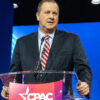Shilling for his new global warming book on Meet the Press yesterday Thomas Friedman told Tom Brokaw:
Well, I’m against Manhattan Project because this problem is so large in terms of scale. I think it’s got to be like IT. We need 100,000 people experimenting in 100,000 garages coming up with 100,000 ideas, 100 of which might be promising, 10 might work, and two might be the next green guru.
Friedman’s denunciation of a ‘Manhattan Project’ approach to energy policy is a bit of an evolution for the New York Times columnist who once said that if he were president would “have rallied the nation for real energy conservation and initiated a Manhattan Project for alternative energies.” But later in the same MTP interview, Friedman’s big government instincts just can’t help themselves. He told Brokaw: “You know, what we need today, Tom–we had a space race with the Russians, who could be the first to put a man on the moon. What we need today is an Earth race with China, with Europe, with Japan, to see who can create the technologies to make the Earth livable for man.” Sounds like Friedman’s calling for a new Apollo project to us.
But as Popular Mechanics editor in chief James Meigs explains, government directed Apollo/Manhattan approaches to alternative energy are not the answer:
Yes, the moon landing was a towering achievement. But, as aerospace analyst Rand Simberg notes, it was also a “well-defined engineering challenge, and a problem susceptible to having huge bales of money thrown at it.” Retooling America’s energy infrastructure is far more complex. It isn’t one challenge, it’s thousands—a total overhaul of the American lifestyle involving deep changes in every home, vehicle and business in the country.
Meigs concludes:
The government can play a role in advancing alternative energy. Tax incentives and regulatory relief can help. So can research money channeled through the National Science Foundation or DARPA. But let’s tread lightly when it comes to giving handouts to corporations in the name of research.
…
With oil trading at far over $100 a barrel, companies already have incentives to develop alternatives—the market will reward breakthroughs handsomely. In fields ranging from batteries to biofuels, there are hundreds of promising research projects under way. Some will succeed, some won’t. But we need scientists, entrepreneurs and consumers to pick the winners, not politicians. Finding solutions to our energy problems isn’t rocket science. It’s a lot tougher.























